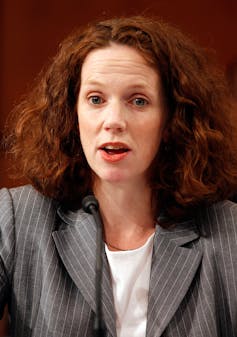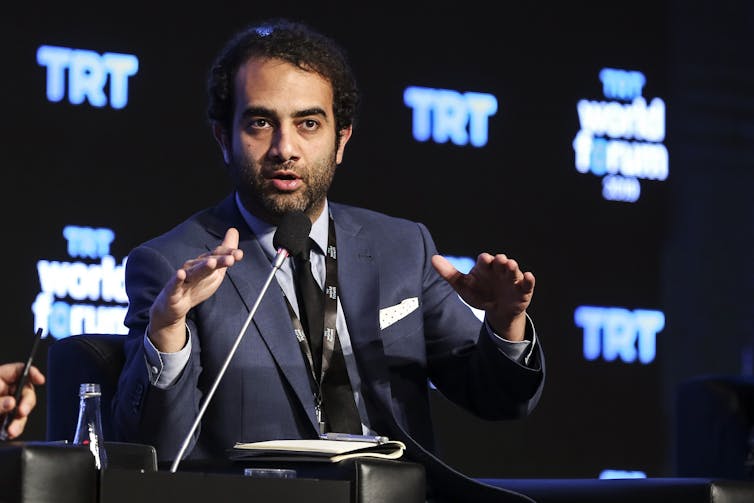Brag and name drop: How to project credibility as workplace meetings move online
- Written by Lisa Leopold, Associate Professor of English Language Studies, The Middlebury Institute of International Studies at Monterey, Middlebury
 Amid the global work-from-home phenomenon, what a presenter says carries more weight than ever.Getty Images
Amid the global work-from-home phenomenon, what a presenter says carries more weight than ever.Getty ImagesCOVID-19 has altered nearly every aspect of American life, including the workplace. For millions of Americans, the kitchen or the living room now doubles as the office and conference room.
This workspace shift, likely to last long past the pandemic, offers some conveniences, of course, but it also teems with potential pitfalls.
Traditional tactics for achieving credibility in presentations – audience interaction and engaging body language, for example – are not accessible when you appear on a laptop or smartphone screen.
Suddenly, what you say carries more weight than ever.
As an English language studies professor, I wanted to understand how presenters build credibility, so I analyzed the transcripts of 30 panel discussions at the Brookings Institution in 2019 to glean the verbal strategies used by foreign affairs experts. While I have carefully dissected these strategies as a specialist in public speaking skills, they boil down to a simple message for anyone delivering a presentation via a digital screen: Brag and name drop.
11 strategies for building credibility
Here are specific examples of the many techniques I detected.
1. Prestigious affiliation: Establishes ties to a prestigious organization. Kathleen Hicks, of the Center for Strategic and International Studies, does that here: “…the conclusion of the commission on which I serve, the National Defense Strategy Commission, and certainly the work I do in my job at CSIS…”
2. Prestigious title: Names impressive position titles. Yael Tamir, a professor at the University of Oxford, stated, “I was a minister of immigration (in Israel) about 12 years ago…”
 Suzanne Maloney testifies before the Senate Foreign Relations Committee in Washington, D.C.Chip Somodevilla/Getty Images
Suzanne Maloney testifies before the Senate Foreign Relations Committee in Washington, D.C.Chip Somodevilla/Getty Images3. Disciplinary expertise: Highlights area of professional expertise. Suzanne Maloney, deputy director of foreign policy at Brookings, said, “From my perspective, as someone who works on Iranian internal politics and economics, and on the U.S.-Iran relationship…”
4. Professional identity: Claims affiliation with a professional community. Tamir, the Oxford professor, stated, “It all starts with the definition as we know, as we political theorists know…”
5. Professional experience: Underscores the breadth or impact of professional experience. Jeannine Scott, of the nonprofit Constituency for Africa, emphasized a résumé few have: “If you’ve engaged with the Continent as I have for over 30 years now…”
6. Professional accomplishments: Highlights career achievements, as Lynn Rusten, a vice president at the Nuclear Threat Initiative, did: “What’s interesting is the original START Treaty, which I also helped negotiate…”
7. Educational experience: Mentions educational institution attended, area studied or degree earned. Adam La Reau, a Navy veteran, said the following: “I went to the U.S. Merchant Marine Academy…”
8. Self-citation: Cites one’s own public comments. Brett McGurk, a senior fellow at the Carnegie Endowment for International Peace, stated: “I was on record in 2013 about this rising threat and I testified…”
9. Prominent connections: Mentions interactions with prominent individuals, as McGurk did: “And walking into a meeting with President Obama and the national security team, I got a phone call from a very senior Iraqi official who said…”
10. Professional reputation: Shows that others seek their expertise, like Jung Pak, a senior fellow at the Center for East Asia Policy Studies: “During the Fire and Fury days (President Trump’s threat against North Korea in 2017), I got lots of phone calls from friends from New York, to the Midwest, to L.A. wondering about whether they should go on their business trip…”
 Shadi Hamid speaks at the TRT World Forum 2019 in Istanbul, Turkey on Oct. 22, 2019.Serhat Cagdas/Anadolu Agency via Getty Images
Shadi Hamid speaks at the TRT World Forum 2019 in Istanbul, Turkey on Oct. 22, 2019.Serhat Cagdas/Anadolu Agency via Getty Images11. Personal background: Discloses religion, nationality, ethnicity or other personal characteristics. Shadi Hamid, a senior fellow at Brookings, said: “This was a very minoritarian take on Islam, and in my view as a Muslim myself, a perverted one.”
Using the strategies
These strategies were typically used as additional information within a sentence. For example, if Maloney, the senior fellow at Brookings, were to cut her disciplinary expertise in the following sentence – the phrase within the commas – it would still make rational sense: “From my perspective, as someone who works on Iranian internal politics and economics and on the U.S.-Iran relationship, we are coming at the end of a long period of limbo.”
Maloney avoids sounding arrogant by not featuring her disciplinary expertise in a separate sentence, an important point for those who wish to build credibility – but not sound pretentious.
Creating community: ‘We see’
Speakers often used the expression “we see” to deepen affiliation with an expert community and make nonbiased observations. In this excerpt, Bilyana Petkova, a fellow at the Electronic Privacy Information Center, illustrates her insider information about the data privacy field: “So, in the data privacy field, we see how this dynamic has played out a role in the E.U., where the first data privacy statute was adopted in the German locality of Hassan…”
Using “we” rather than “I” helps speakers relate their observations to those of experts and reduce perceptions that they are sharing a biased view.
Elevating stature: ‘If you’
Speakers often emphasized exclusive knowledge or professional experience by using the phrase “if you.”
Dennis Wilder, managing director of the U.S.-China Dialogue on Global Issues at Georgetown University, said: “One of the things to understand if you haven’t been involved in a presidential visit to a place like Beijing…” With this phrase, he builds his stature by pointing to his prestigious experience.
[Understand new developments in science, health and technology, each week.Subscribe to The Conversation’s science newsletter.]
Panelists drew this expert-novice distinction in other ways, too. They emphasized familiarity with current events, for example, with phrases such as “If you look at what the intelligence community and the Department of Defense have been saying” and “If you look at the U.S. and Russian statements… this week.”
It’s not just the knowledge we hold that builds credibility – how we communicate that knowledge is also imperative.
With companies like Facebook paving the way for permanent remote work, Americans will be forced to rethink how we achieve credibility in workplace presentations. Amid the uncertainty created by the pandemic, what’s certain is that verbal communication strategies will become even more critical to our perceived competence and success.
Lisa Leopold does not work for, consult, own shares in or receive funding from any company or organization that would benefit from this article, and has disclosed no relevant affiliations beyond their academic appointment.
Authors: Lisa Leopold, Associate Professor of English Language Studies, The Middlebury Institute of International Studies at Monterey, Middlebury

